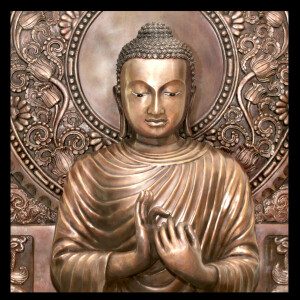
There's More to Life than just being Alive - Lockdown Anxiety about 1st Precept
 2021-08-13
2021-08-13
Download
Right click and do "save link as"
Ajahn Dhammasiha is asked about lockdown-anxiety regarding the first Buddhist precept, namely to abstain from killing any living beings. Are we breaking the first precept if we inadvertently infect someone else with corona virus, and then that person might die?
Ajahn points out that INTENTION is a necessary factor to break the precept against killing. If we have no intention to infect anyone, and we are not even acting negligently or carelessly in our interactions, we can not possibly break the first precept or create bad karma, even if we unknowingly, inadvertently happened to cause an infection.
Moreover, Ajahn reminds us that it is part of being human, part of having a human body, to be potentially infectious to others. There are countless small beings living inside and on our body: Bacteria, germs, viruses, yeast, fungi, and all kinds of parasites. Just the bacteria in our guts can weigh more than one kilo. In fact, we need them to live. They are required for proper digestion.
If we were to kill all bacteria and other tiny organisms in our body, we would end up dying ourselves. Human beings can not be aseptic. Only a robot or a plastic doll could be made aseptic. Human beings are shedding pathogens all the time, that can not be completely prevented ever. The question is simply to find the right balance between reducing danger of infection, and still being able to live a human life.
There is more to life than just being alive. Human life entails interaction with other human beings. That's another thing which is quintessentially human, and as long as we remain human, interaction with others can never be completely prevented. And interaction between humans will involve some sharing of germs by necessity. Again, the question is simply how to reduce potentially dangerous transmission, but without losing our humanity in the process.
In the beginning, Ajahn quotes Dhammapada Verse 112:
Even if one were to live a hundred years,
Lazy, indolent, indifferent;
It'a preferable to live a single day,
With genuine effort in one's spiritual practise.
Yo ca vassasataṃ jīve
Kussīto hīnaviriyo;
Ekāhaṃ jīvitaṃ seyyo,
Viriyam-ārabhato daḷhaṃ.
Here he Buddha clearly expresses that live is not just about quantity, but quality is more imortant. And the highest, most important quality to make life truly worth living is striving in one's meditation, putting forth effort to overcome greed, hatred and delusion, and to develop kindness, compassion and letting go.
Trying to maximise the length of our life by sacrificing our ability to practise our religion would thus be a very bad idea.www.dhammagiri.org.auwww.facebook.com/dhammagiri-forest-hermitagewww.youtube.com/channel/UCJINt0JJBfFm_x0FZcU9QJwwww.tinyletter.com/dhammagiri/archive
view more
More Episodes
012345678910111213141516171819
Create your
podcast in
minutes
- Full-featured podcast site
- Unlimited storage and bandwidth
- Comprehensive podcast stats
- Distribute to Apple Podcasts, Spotify, and more
- Make money with your podcast
It is Free
- Privacy Policy
- Cookie Policy
- Terms of Use
- Consent Preferences
- Copyright © 2015-2024 Podbean.com






